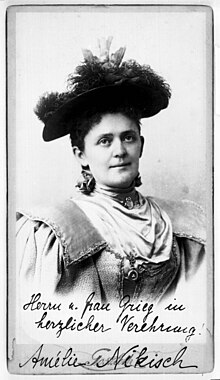Amélie Nikisch
Amélie Nikisch | |
|---|---|
 | |
| Born | Amélie Augusta Heussner 28 December 1862 Brussels, Belgium |
| Died | 18 January 1938 Berlin, Germany |
| Occupation(s) | Singer, composer |
| Spouse | Arthur Nikisch |
| Children | 4, including Mitja Nikisch |
Amélie Heussner Nikisch (28 December 1862 – 18 January 1938) was a Belgian soprano, actress, voice teacher, and composer.
Early life[edit]
Amélie Augusta Heussner was born in Brussels.[1]
Career[edit]
As a young woman, Heussner played soubrette roles in operas in Kassel and Leipzig.[1] She taught voice lessons after she married in 1885.[2] While her husband, Arthur Nikisch, was conducting the Boston Symphony Orchestra from 1890 to 1893, she frequently performed with the orchestra as a soprano soloist.[3] "If anything, Mme. Nikisch's work as a vocalist might be characterized as too finished for the appreciation of the general public", noted an American newspaper in 1891, "free from all the tricks and devices that are too frequently resorted to for effect and applause".[4]
Nikisch wrote music and lyrics for light operas. Her compositions included the operettas Prinz Adolar und das Tausendschönchen (1907, with Ilse Friedlaender),[5] Meine Tante, deine Tante (1909),[6] Daniel in der Löwengrube (1914, with Friedlaender),[7] and Immer der Andere (1915).[8]
One of her voice students was American soprano Eleanor Painter Strong.[9]
Personal life[edit]
Amélie Heussner married Hungarian conductor Arthur Nikisch (1855–1922) in 1885.[1] They had four children; their younger son was pianist Mitja Nikisch (1899–1936).[10] Amélie Nikisch died in 1938, in Berlin, aged 75 years. Her daughter Eleanora (Nora) Schindler married a Jewish actor, and fled Nazi persecution with help from the Nikisches' musical contacts, moving to the United States in 1941.[11][12]
References[edit]
- ^ a b c Grove, Sir George (1907). Grove's Dictionary of Music and Musicians. Macmillan. p. 380.
- ^ Gideon, Henry L. (February 1910). "The Musical Trinity of Leipsic". The Musician. 15: 86.
- ^ "Performance History Search: Amélie Nikisch". Boston Symphony Orchestra. Retrieved 2021-03-31.
- ^ "Amusements". The Inter Ocean. 1891-05-08. p. 4. Retrieved 2021-03-31 – via Newspapers.com.
- ^ "Leipsic". Musical Courier. 54: 32. January 9, 1907.
- ^ "Opera by Mrs. Nikisch; Wife of Musical Conductor Composes Both Words and Music". The New York Times. 1909-08-08. Retrieved 2021-03-31.
- ^ "Hamburg". The Musical Times and Singing Class Circular. 54: 405. June 1, 1913.
- ^ "Operetta by Mme. Nikisch Brought Out in Leipsic". Musical America. 22: 14. January 12, 1915.
- ^ Goldenburg, William Smith (1930-03-23). "Romance of the Stage". The Cincinnati Enquirer. p. 65. Retrieved 2021-03-31 – via Newspapers.com.
- ^ Smith, Frank Dabba (2007). "Dr Ernst Leitz II of Wetzlar and the People He Helped During The Shoah: Research in Progress". European Judaism: A Journal for the New Europe. 40 (1): 3–37. doi:10.3167/ej.2007.400102. ISSN 0014-3006. JSTOR 41443873.
- ^ Smith 2007, pp. 22–23, 36.
- ^ Abell, Arthur M. (April 27, 1941). "An Appeal for Aid for Daughter of Artur Nikisch". The New York Times. p. X6 – via ProQuest.
